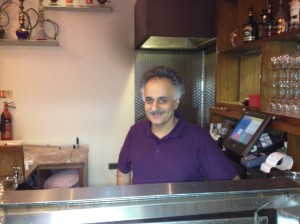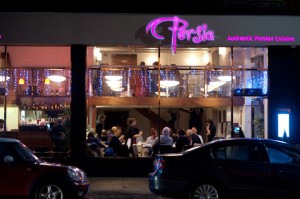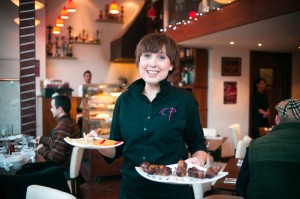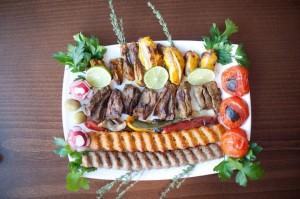 ][1]
][1]The latest in the blog’s intermittent series of Chewin’ the Fat interviews is with Farhad Ghomashchian, the man behind Persia restaurant on Glasgow’s Great Western Road.
Open since 2010, the 65 cover restaurant has attracted great reviews from Joanna Blythman in the Sunday Herald; Ron Mackenna in The Herald and The Times. The ever discerning 5pm customer base have also been pretty taken with Persia.
At the time of writing, just over fifty of you have given Persia a very respectable combined score of 4.1/5.
Born in Iran, Farhad came to the UK to study in the mid-Seventies and, apart from a stint in Dubai, has lived here ever since. He first came to Glasgow to study chemical engineering and married a Glasgow girl.
There is catering in Farhad’s family background and, among other careers, he has also worked in the restaurant trade.
In this Chewin’ the Fat chat he tells the blog why the time is right for Persian food in Glasgow.
 ][5]
][5]Had you always wanted to open a Persian restaurant in Glasgow?
FG) It had always been my ambition to open a restaurant here. During the Eighties and perhaps the Nineties, I don’t think Glasgow would have been ready for a Persian restaurant.
My family all live in Los Angeles where there is a massive Persian community. I would visit my family and go to pizza restaurants where they would bake the pizza in wood-fired ovens. Then I would come back to Glasgow where some places would cook pizza in a frying pan. It was awful but, over the last fifteen years or so, it’s all changing. People’s awareness of other cuisines; their knowledge of food and healthy eating have all increased considerably.
Can you tell us about some typical Persian ingredients?
FG) Persian food is one of the oldest cuisines in the world and it is also one of the most varied. The geography and history of Iran is very multicultural. There are Turkish speaking people; Russians by the Caspian Sea; there are Arabs, Kurds, lots of different languages and lots of different foods from a hugely varied geography. In winter, you can go from mountains where it’s minus 20C to the coast where it’s warm enough to swim in the sea. Add in the influence of the historical spice routes plus Iran’s long trading history and it’s a very colourful mix.
All those different people and climates mean an abundance of different ingredients and ways of cooking them. So, there is very little frying in Persian food but there is more grilling, especially of lamb, fish and poussin. We use a lot of fresh herbs like coriander, parsley and mint alongside pomegranates and dried berries. Aubergines, both smoked and grilled feature. There is a lot of pulses and different flavoured rice. It’s very healthy.
 ][6]
][6]What has been the biggest challenge for the restaurant?
FG) Everyone in Glasgow knows about Italian or Indian food. Our challenge is getting them to know about and be interested in Persian food. Over the weekend, our customers are mostly Scots but they are people who know about Persian food because they have eaten it before or travelled to the Middle East.
Our challenge is to attract other people in. I’m confident in our product and confident in what we do. Once people come here, they tend to come back and eat again.
Do you think people have the wrong idea of what Persian food is?
FG) There is a misconception that it is like Indian food but it’s totally different. Indian food is rich and uses a lot of spice, Persian food is not and it hardly uses any chilli, but does use lots of saffron and herbs.
Have you had to adapt the menu to fit your customers’ tastes?
FG) At first, we wanted to be very traditional. Persian restaurants in Los Angeles make no compromises about Persian cuisine. It’s just as Persians would expect it to be.
We have evolved so that while our dishes are traditional, they are also presented in a more contemporary modern way. Some differences are cultural. One of the challenges we had here was that our Middle Eastern customers would complain that there was not enough rice. Historically, if you were brought up in the Middle East then rice is part of your staple diet and you expect to be served a lot of it. Our Scottish customers would complain that there was too much. We try to adapt and keep everyone happy.
 ][7]
][7]